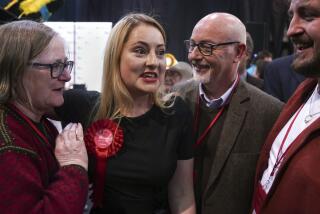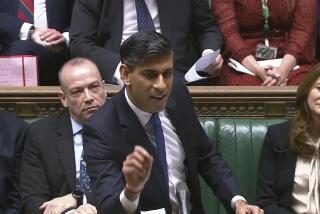Tuition Vote Embarrassingly Close for Blair
- Share via
LONDON — Prime Minister Tony Blair eked out a Parliament win Tuesday on a bill to increase university tuition, staving off a major revolt within his own Labor Party that reflected a widespread fraying of support for his government.
The measure squeaked through the House of Commons 316 to 311, a minuscule margin considering Labor’s 161-vote majority. About 70 Labor members deserted Blair in the vote, the highest total since 139 members of his party balked at supporting Britain’s entry into the Iraq war in March.
If Blair -- already under a political cloud for leading his country into the deeply unpopular war -- had failed to win approval for the tuition bill, a cornerstone of his government’s social reform program, it would have been a huge humiliation and increased calls for him to resign or face a confidence vote.
After a day of nail-biting negotiations in which it first seemed that the government lacked the votes to prevail, a few self-proclaimed rebels came through for Labor. Among them was Austin Mitchell, who said his vote was cast “with gritted teeth and very miserably.” There was heavy arm-twisting from party whips along the way, he said.
“All the reasons for voting were to do with dear old Tony -- ‘Preserve Tony for the nation,’ ‘Don’t vote with the Tories’ -- nothing to do with the bill,” he said.
George Walden, a former minister of higher education in the Conservative government, said there was hypocrisy on all sides. Conservatives voted against the bill, he said, even though they in essence agreed with the Labor government’s proposal.
“There is no question that Tories believe in paying fees.... You can’t have free universities in a large country, because then they’ll be deadbeat universities,” he said.
Although the tuition rates proposed by Labor would be low by U.S. standards, and payment could be deferred until students graduate and get jobs, the bill drew howls of protest from student groups and poor and middle-class parents, who consider virtually free higher education a national entitlement.
Blair argued that allowing the better universities to charge students as much as $5,400 annually to underwrite higher pay for instructors and better facilities was necessary to make British universities competitive internationally, and that the bill was coupled with significant financial support to encourage poorer students.
The vote Tuesday was the second reading of the bill. It will be tweaked before coming up again for a final vote in the House of Commons, and then must gain acceptance in the House of Lords before taking effect.
Although the government prevailed, the consensus among political observers was that the closeness of the vote left Blair weakened.
“Clearly, Blair’s authority in the party, although not smashed, has shown its limits,” John Curtice of the University of Strathclyde told Reuters.
The vote came on the eve of another potentially damaging event for Blair: the release of a report by a senior judge, Lord Hutton, looking into how the government handled intelligence before the Iraq war and whether the government exposed weapons expert David Kelly to humiliation for political reasons, contributing to his suicide.
The struggle over tuition laid bare the main fault line running through the Labor Party: the divide between “New Labor,” which seeks to preserve Britain’s financially strapped public services by introducing some measure of private funding, and the stalwarts of “Old Labor,” who would like to keep the traditional social-welfare system intact.
“Even after six years in government, there is a genuine struggle inside Labor between Blair and a strain in the party that sticks to a belief in the principle of equality, even if that means dull uniformity,” said Philip Stephens, author of a new biography of Blair.
Special correspondent William Wallace and Janet Stobart of The Times’ London Bureau contributed to this report.
More to Read
Sign up for Essential California
The most important California stories and recommendations in your inbox every morning.
You may occasionally receive promotional content from the Los Angeles Times.













